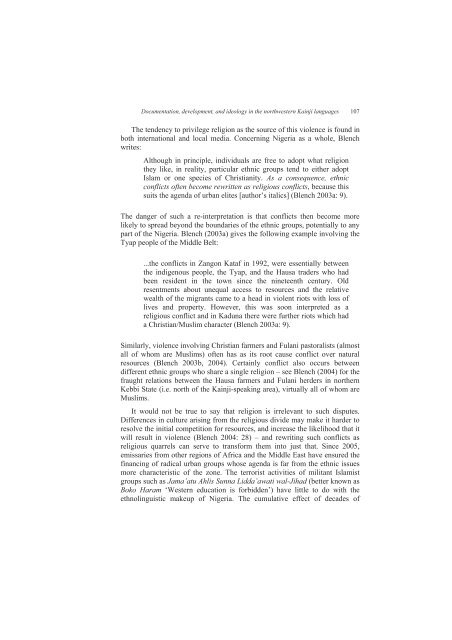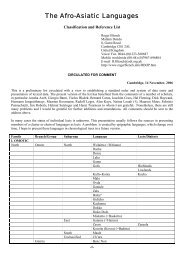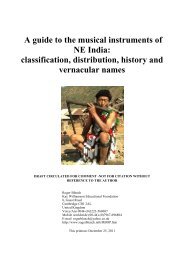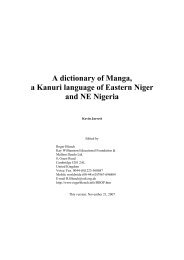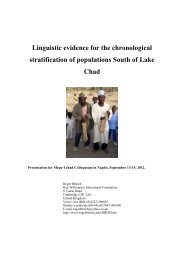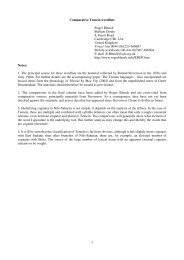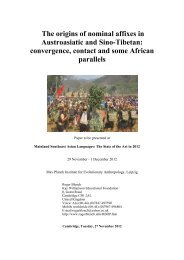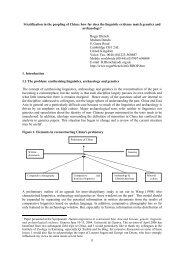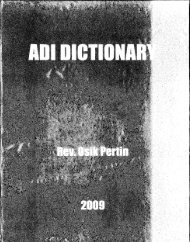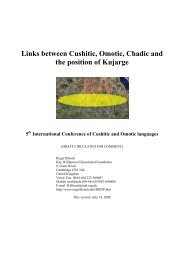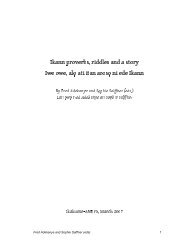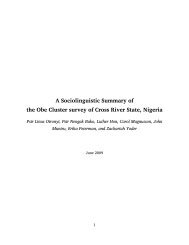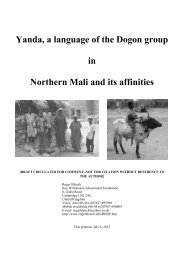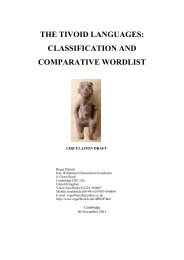Documentation, development, and ideology in the ... - Roger Blench
Documentation, development, and ideology in the ... - Roger Blench
Documentation, development, and ideology in the ... - Roger Blench
You also want an ePaper? Increase the reach of your titles
YUMPU automatically turns print PDFs into web optimized ePapers that Google loves.
<strong>Documentation</strong>, <strong>development</strong>, <strong>and</strong> <strong>ideology</strong> <strong>in</strong> <strong>the</strong> northwestern Ka<strong>in</strong>ji languages 107<br />
The tendency to privilege religion as <strong>the</strong> source of this violence is found <strong>in</strong><br />
both <strong>in</strong>ternational <strong>and</strong> local media. Concern<strong>in</strong>g Nigeria as a whole, <strong>Blench</strong><br />
writes:<br />
Although <strong>in</strong> pr<strong>in</strong>ciple, <strong>in</strong>dividuals are free to adopt what religion<br />
<strong>the</strong>y like, <strong>in</strong> reality, particular ethnic groups tend to ei<strong>the</strong>r adopt<br />
Islam or one species of Christianity. As a consequence, ethnic<br />
conflicts often become rewritten as religious conflicts, because this<br />
suits <strong>the</strong> agenda of urban elites [author’s italics] (<strong>Blench</strong> 2003a: 9).<br />
The danger of such a re-<strong>in</strong>terpretation is that conflicts <strong>the</strong>n become more<br />
likely to spread beyond <strong>the</strong> boundaries of <strong>the</strong> ethnic groups, potentially to any<br />
part of <strong>the</strong> Nigeria. <strong>Blench</strong> (2003a) gives <strong>the</strong> follow<strong>in</strong>g example <strong>in</strong>volv<strong>in</strong>g <strong>the</strong><br />
Tyap people of <strong>the</strong> Middle Belt:<br />
...<strong>the</strong> conflicts <strong>in</strong> Zangon Kataf <strong>in</strong> 1992, were essentially between<br />
<strong>the</strong> <strong>in</strong>digenous people, <strong>the</strong> Tyap, <strong>and</strong> <strong>the</strong> Hausa traders who had<br />
been resident <strong>in</strong> <strong>the</strong> town s<strong>in</strong>ce <strong>the</strong> n<strong>in</strong>eteenth century. Old<br />
resentments about unequal access to resources <strong>and</strong> <strong>the</strong> relative<br />
wealth of <strong>the</strong> migrants came to a head <strong>in</strong> violent riots with loss of<br />
lives <strong>and</strong> property. However, this was soon <strong>in</strong>terpreted as a<br />
religious conflict <strong>and</strong> <strong>in</strong> Kaduna <strong>the</strong>re were fur<strong>the</strong>r riots which had<br />
a Christian/Muslim character (<strong>Blench</strong> 2003a: 9).<br />
Similarly, violence <strong>in</strong>volv<strong>in</strong>g Christian farmers <strong>and</strong> Fulani pastoralists (almost<br />
all of whom are Muslims) often has as its root cause conflict over natural<br />
resources (<strong>Blench</strong> 2003b, 2004). Certa<strong>in</strong>ly conflict also occurs between<br />
different ethnic groups who share a s<strong>in</strong>gle religion – see <strong>Blench</strong> (2004) for <strong>the</strong><br />
fraught relations between <strong>the</strong> Hausa farmers <strong>and</strong> Fulani herders <strong>in</strong> nor<strong>the</strong>rn<br />
Kebbi State (i.e. north of <strong>the</strong> Ka<strong>in</strong>ji-speak<strong>in</strong>g area), virtually all of whom are<br />
Muslims.<br />
It would not be true to say that religion is irrelevant to such disputes.<br />
Differences <strong>in</strong> culture aris<strong>in</strong>g from <strong>the</strong> religious divide may make it harder to<br />
resolve <strong>the</strong> <strong>in</strong>itial competition for resources, <strong>and</strong> <strong>in</strong>crease <strong>the</strong> likelihood that it<br />
will result <strong>in</strong> violence (<strong>Blench</strong> 2004: 28) – <strong>and</strong> rewrit<strong>in</strong>g such conflicts as<br />
religious quarrels can serve to transform <strong>the</strong>m <strong>in</strong>to just that. S<strong>in</strong>ce 2005,<br />
emissaries from o<strong>the</strong>r regions of Africa <strong>and</strong> <strong>the</strong> Middle East have ensured <strong>the</strong><br />
f<strong>in</strong>anc<strong>in</strong>g of radical urban groups whose agenda is far from <strong>the</strong> ethnic issues<br />
more characteristic of <strong>the</strong> zone. The terrorist activities of militant Islamist<br />
groups such as Jama’atu Ahlis Sunna Lidda’awati wal-Jihad (better known as<br />
Boko Haram ‘Western education is forbidden’) have little to do with <strong>the</strong><br />
ethnol<strong>in</strong>guistic makeup of Nigeria. The cumulative effect of decades of


